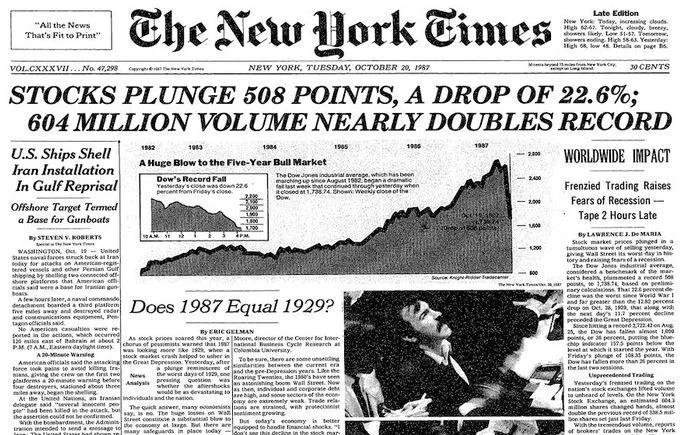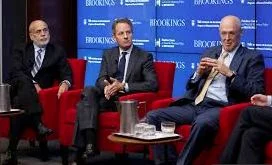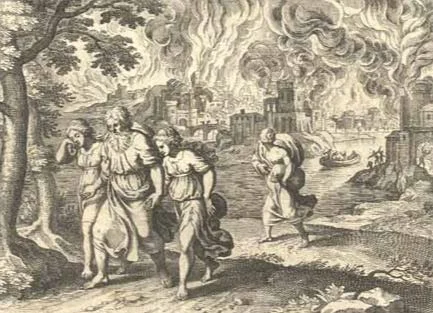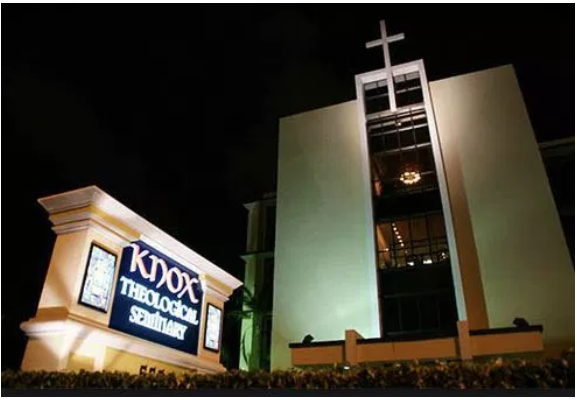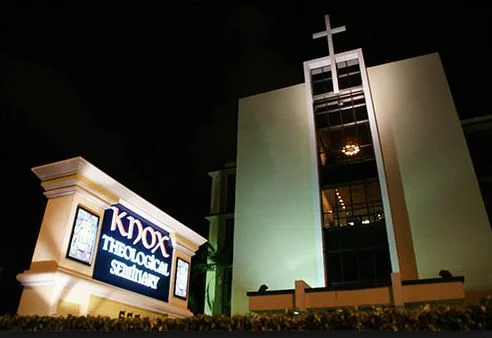Well, what I wanted to talk about for a few minutes is the various efforts that are going on in public and behind the scenes by the Fed and other government officials to guard against a free-fall in the markets...
- Former Clinton advisor George Stephanopolous on Good Morning America
Last week's post served as an introduction to the President's Working Group on Financial Markets, better known to the public as the Plunge Protection Team.
It seemed good this week to spend a little more time on the same subject, as the existence and the activities of this organization are perhaps the most important, least understood and most underreported factors driving financial markets today.
Financial markets such as the New York Stock Exchange are presented to the public as the very essence of free market capitalism. But in the opinion of this writer, the reality is something quite different.
Far from being a place where buyers and sellers meet to determine fair value for financial assets, today's financial markets are a rigged game designed to mislead the public about the true nature of the financial condition of the West.
Some may wonder why a Christian blogger would delve into the subject of the Plunge Protection Team (PPT). It seems on the surface as if it's a bit conspiratorial, a topic more appropriate for some tin foil hat blogger than for someone intent and spreading the light of truth. But to see the discussion of the PPT in this light is, at least in my view, a serious mistake.
That the PPT is a real entity with real power is a very easy matter to prove. The case that it has been and is being used by the powers that be to prop up favored markets and suppress those out of favor, though circumstantial in nature, is quite strong.
Exposing such chicanery is among the most important tasks a Christian financial writer can undertake. As University of Austin finance professor John Griffin recently noted, the Bible's command to "Have nothing to do with the fruitless deeds of darkness, but rather expose them," can be applied to outing the lies and fraudulent activities of powerful financial and governmental interests in the same way it can be applied to other evil deeds.
With that in mind, let's take a closer look at the PPT.
The Establishment of the Plunge Protection Team
Perhaps the most sensible place to begin our discussion of the PPT is with Executive Order 12631 of March 18, 1988. You may find it here in the Federal Register. But since it's only a few hundred words long, I'll reproduce it in full below.
Executive Order 12631--Working Group on Financial Markets
Source: The provisions of Executive Order 12631 of Mar. 18, 1988, appear at 53 FR 9421, 3 CFR, 1988 Comp., p. 559, unless otherwise noted.
By virtue of the authority vested in me as President by the Constitution and laws of the United States of America, and in order to establish a Working Group on Financial Markets, it is hereby ordered as follows:
Section 1. Establishment. (a) There is hereby established a Working Group on Financial Markets (Working Group). The Working Group shall be composed of:
(1) the Secretary of the Treasury, or his designee;
(2) the Chairman of the Board of Governors of the Federal Reserve System, or his designee;
(3) the Chairman of the Securities and Exchange Commission, or his designee; and
(4) the Chairman of the Commodity Futures Trading Commission, or her designee.
(b) The Secretary of the Treasury, or his designee, shall be the Chairman of the Working Group.
Sec. 2. Purposes and Functions. (a) Recognizing the goals of enhancing the integrity, efficiency, orderliness, and competitiveness of our Nation's financial markets and maintaining investor confidence, the Working Group shall identify and consider:
(1) the major issues raised by the numerous studies on the events in the financial markets surrounding October 19, 1987, and any of those recommendations that have the potential to achieve the goals noted above; and
(2) the actions, including governmental actions under existing laws and regulations (such as policy coordination and contingency planning), that are appropriate to carry out these recommendations.
(b) The Working Group shall consult, as appropriate, with representatives of the various exchanges, clearinghouses, self-regulatory bodies, and with major market participants to determine private sector solutions wherever possible.
(c) The Working Group shall report to the President initially within 60 days (and periodically thereafter) on its progress and, if appropriate, its views on any recommended legislative changes.
Sec. 3. Administration. (a) The heads of Executive departments, agencies, and independent instrumentalities shall, to the extent permitted by law, provide the Working Group such information as it may require for the purpose of carrying out this Order.
(b) Members of the Working Group shall serve without additional compensation for their work on the Working Group.
(c) To the extent permitted by law and subject to the availability of funds therefore, the Department of the Treasury shall provide the Working Group with such administrative and support services as may be necessary for the performance of its functions.
So what can we glean from this short but not so sweet E.O.?
For one, it's a high-powered group. As Section one tells us, it is comprised of the Secretary of the Treasury, the Chairman of the Federal Reserve, the Chairman of the Securities and Exchange Commission and the Chairman of the Commodities Futures Trading Commission.
In fact, one would have a hard time coming up with a higher powered group of financial overseers than the officers referred to above.
But it's not just the group's power that's impressive. It's also highly secretive.
Consider the US Treasury Department, home to a powerful and secretive group known as the Exchange Stabilization Fund (ESF). The ESF was, as it were, born in monetary sin and shapen in financial iniquity, the seed capital of which was extracted out of the hides of the American public by the iniquitous Gold Reserve Act of 1934. As Investopedia notes,
The Gold Reserve Act of 1934 is an act that took away the title of all gold and gold certificates that were held by the Federal Reserve Bank. The Gold Reserve Act of 1934 made the trade and possession of gold a criminal offense for the citizens of the United States. Sole title of this gold was given to the U.S. Treasury. It was not until 1975 that Americans could again own or trade gold.
Article 1 Section 10 of the US Constitution reads, "No state shall...make any Thing but gold and silver Coin a Tender in Payment of Debts," but the after less than 150 years, the federal government decided it was proper to criminalize the possession of real money. In this writer's opinion, that's about all you need to know to properly assess the authoritarian character of the members of Congress who drafted the legislation and of Franklin D. Roosevelt who signed it in to law.
Worth noting is that Gold Reserve Act completed the transfer of wealth from the American people to the federal government that had begun the previous year with Executive Order 6102, which required Americans to turn in, "all gold coin, gold bullion, and gold certificates now owned by them to a Federal Reserve Bank." Roosevelt's Executive Order required that this be done by May 1, 1933, with criminal penalties of a, "$10,000 fine or 10 years imprisonment, or both."
"The main rationale behind the order," Wikipedia notes, "was actually to remove the constraint on the Federal Reserve which prevented it from increasing the money supply during the depression." In other words, the Fed couldn't rob people effectively enough when they had gold in their possession. First they had to take the gold, then the powers that be could go about the nefarious business of plundering the people.
Once the government had the gold, it didn't take long for them to finish their act of robbery. Another feature of the Gold Reserve Act (GRA) was that it revalued gold. Prior to the passing of the GRA, gold was valued at $20.67 per ounce. The GRA set the price of gold at $35 per ounce, meaning that upon its passing, Americans immediately suffered a loss of about 69% on the gold forcibly taken from them by the FDR's 1933 Executive Order.
Question: So if the American people lost 69% on their gold, did that wealth just disappear? Answer: Of course not! The stolen wealth was merely transferred to the Treasury where it was used as seed capital for the ESF.
As Wikipedia rightly notes, "The resulting profit that the government realized funded the Exchange Stabilization Fund established by the Gold Reserve Act of 1934."
The ESF has now been in business for 84 years, making it one of the longest running and egregious criminal enterprises in Washington D.C. And given the many outrageous crimes committed daily in the Swamp, that's saying quite a lot.
The Federal Reserve, the central bank of the United States, while more in the public eye than the ESF, still manages to operate to a large extent in secrecy. Several attempts have been made to audit the Fed over the years, but to date, the Fed has successfully resisted all attempts to open its books to public scrutiny.
Then Fed Chairman Janet Yellen's letter to House Speaker Paul Ryan and Minority Leader Nancy Pelosi is instructive on this point. In her letter dated November 16, 2015, Yellen objected to auditing the Fed, saying that subjecting the Fed to an audit would, "politicize monetary policy decision...undermine the independence of the Federal Reserve," and was, "based on the false premise - that the Federal Reserve is not subject to an audit."
While the Fed may be audited in some sense as Yellen argues, it's not the type of thoroughgoing audit Ron Paul and Rand Paul have argued for over the years.
Yellen, as Fed Chairmen before her, and doubtless as those who will come after her such as current Fed Chairman Jay Powell, was jealous to guard the Fed's "independence." Translated into plain English, she wants to continue the ability of the Fed to serve the interests of the financial elite, principally the big banks that own the Fed, at the expense of the American people.
Evidence of the PPT's Handiwork
For our purposes, I will not go in to a great deal of technical detail in an attempt to prove the case that the PPT manipulates markets. Rather, I shall rely on quotes from those who would know. Considering that these quotes come from highly placed and well-qualified individuals, their comments deserve serious consideration.
The term Plunge Protection Team can be traced to a 1997 article in the Washington Post of the same name. According to the piece, "The government has a real role to play to make a 1987-style sudden market break less likely." So just how does the PPT do this? Well, the article doesn't say specifically. It talks about ensuring communication between government agencies remains open. But does mere communication help stabilize markets in the midst of a crisis? Imagine the following conversation:
Treasury Secretary: Hey, the S&P's off 5% already and it's only 11am!! What do you think?
Fed Chairman: Yep, darn if it's not.
Talk, as they say, is cheap. And very obviously stabilizing markets requires more than just talk. Implied, though not explicitly stated, is that the Fed and probably the ESF will intervene in the financial markets to produce the sort of "almost miraculous" recovery that occurred the day after 1987's Black Monday. After all, no one can see what the Fed or the ESF are doing with their vast financial resources. "Pay no attention to the man behind the curtain," is not just a famous line from the Wizard of Oz, it's the M.O. of these two groups. And they both have better curtains than did the wizard.
In short, of course the Fed and the ESF are rigging the markets. The Washington Post all but said so back in 1997. "But," as the cheesy infomercials like to put it, "wait, there's more!"
Consider the statement at the top of this post by George Stephanopoulos on Good Morning America. I've seen the date of his appearance as alternatively September 17, 2000 and September 17, 2001. If it was the later, this was the first day that the NYSE reopened after 9/11. In either case, this Clinton insider very clearly hints at governmental intervention in the financial markets to "guard against a free-fall."
The quote from Stephanopoulos continues, "the Fed in 1989 created what is called the Plunge Protection Team, which is the Federal Reserve, big major banks, representatives of the New York Stock Exchange and other exchanges and they have been meeting informally so far, and they have a kind of an informal agreement among major banks to come in and start to buy stock if there appears to be a problem."
In 2015, Dr. Pippa Malmgren who actually served on the PPT and whose father was a high level presidential advisor and scholar made this telling remark," [T]here's no price discovery anymore by the market...governments impose prices on the market."
The New York Post's John Crudele has written critically of the PPT for years. Typical of his work is this story from 2014, " 'Plunge protection' behind market's sudden recovery."
In 2007, Crudele expressed his frustration with the lack of transparency by the US Treasury on the workings of the PPT, writing,
After a year and a half of stalling, the US Treasury finally complied with The Post's requests for information about The President's Working Group on Financial Markets - delivering 177 pages of crap.
In essence, the Treasury's Freedom of Information officials said that the Working Group - affectionately nicknamed the Plunge Protection Team - doesn't keep records of its meetings.
How interesting and convenient!
PhD. economist Paul Craig Roberts, former Undersecretary of the Treasury under Ronald Reagan and former Wall Street Journal Associate Editor, is another highly placed individual whose written extensively on the activities of the PPT. In his article "Do Financial Markets Still Exist?" he wrote, "For many decades the Federal Reserve has rigged the bond market...and for about a century, central banks have set [rigged] interest rates...It appears that...the Fed is rigging the stock market by purchasing S&P equity index futures in order to arrest stock market declines driven by fundamentals."
In December 2008, widely watched market commentator Nouriel Roubini was quoted as saying, "The Fed (or Treasury) could even go as far as directly intervening in the stock market via direct purchase of equities as a way to boost falling equity prices."
Nouriel Roubini was formerly an advisor to New York Fed governor Tim Geithner, a major figure in the 2008 financial crisis.
Market analyst Charles Biderman commented in 2009 that while the market cap of US stocks soared by more than $6 trillion, "We cannot identify the source of the new money that pushed stock prices up so far so fast."
In the same article, Biderman quotes former Fed governor Robert Heller's 1989 Wall Street Journal opinion piece where Heller wrote,
Instead of flooding the entire economy with liquidity, and thereby increasing the danger of inflation, the Fed could support the stock market directly by buying market averages in the futures market, thereby stabilizing the market as a whole.
Do you think a former Fed governor just might know a thing or two about what it takes to rig the stock market?
In a 2017 appearance on CNBC's Smart Money, "Legendary vulture investor Asher Edelman, the 1980's model for Gordon Gekko," argued that, in his view, the PPT was the only thing propping up the market. He also expressed his concern about being in the market, saying that "I don't know when the plug is going to be pulled."
Finally, I come to my main man Dr. Ron Paul. Paul has commented many times over the years on the activities of the PPT. In a May 4, 2018 appearance on CNBC's Futures Now, the good doctor had this to say,
I think the plunge protection team is alive and well. I think they're involved and they do provide some protections. The world is engaged in that type of maneuvering. But eventually though, the market rules.
More examples could be provided, but I hope the above citations, all taken from prominent and respected people, will help the reader to see the PPT less as a myth or conspiracy theory and more as a reality, one which influences the public perception of the stock market and, hence, the entire US economy, and one that accomplishes this end by very dishonest, deceptive and immoral means.
Closing Thoughts
Investopedia, a mainstream, and in many ways helpful, provider of investment information, dismisses any notion of the PPT's manipulating markets as conspiracy theory. As its article on the PPT puts it, "The name PPT was coined by the Washington Post in 1997. Although the team had a viable purpose when initially created, conspiracy theorists suspected that the team was created to shore up, or even manipulate, the markets."
Now where would anybody get such an absurd idea? As the quotes above demonstrate, it's not whackadoo weirdo conspiracy theorists who are the ones talking about the PPT's market manipulations, it's of the most mainstream, most connected, most market savvy voices out there who believe this.
If the PPT is, in fact, manipulating financial markets, and it is the conviction of this author that this is what is happening, the PPT and its constituent organizations such as the US Treasury Department and the Fed are guilty of violating any number of Biblical and Constitutional principles of government.
The origins of the Fed and of the ESF should immediately alert anyone jealous of his liberty that these groups are up to no good. The Fed's origin can be traced to a secretive meeting on Jekyll Island, Georgia in November 1910. The ESF was created by open fraud on the part of Congress and the Roosevelt administration with the cooperation of the previously mentioned Federal Reserve.
The Bible demands open meetings, but the Fed and the ESF love the darkness and will not come to the light, lest their evil deeds be exposed.
Such agencies, based as they are on lies and theft, never can bring forth good fruit. As Jesus said in his Sermon on the Mount, "A bad tree bears bad fruit." And if the Fed and the ESF work evil on their own, what shall we expect when they combine forces in the PPT?
Is it much of a stretch to suppose that such agencies, having worked financial evil on their own, would produce even more evil when they combine forces as part of the PPT?
Should Americans expect transparency and honesty from such bad actors? Or would it be more reasonable to expect that they, like the rulers of the Gentiles in Jesus' day, would "lord it over" the people.
In the opinion of this writer, the answer very obviously is the latter. And one of the ways these organizations "lord it over" the American people is to continually give them a false picture of the real economy by rigging markets to support the official narrative that everything in the economy is awesome, that the stock and bond markets are safe and stable and the best places for your money, and that you should never consider being so foolish as to put your money elsewhere such as gold and silver.
This official rosy scenario was encapsulated in Janet Yellen's comment in June 2017 when she said that another 2008 like financial crisis is not likely "in our lifetime."
To this I would reply, that really depends on whose lifetime you're talking about.
(To be continued...)




